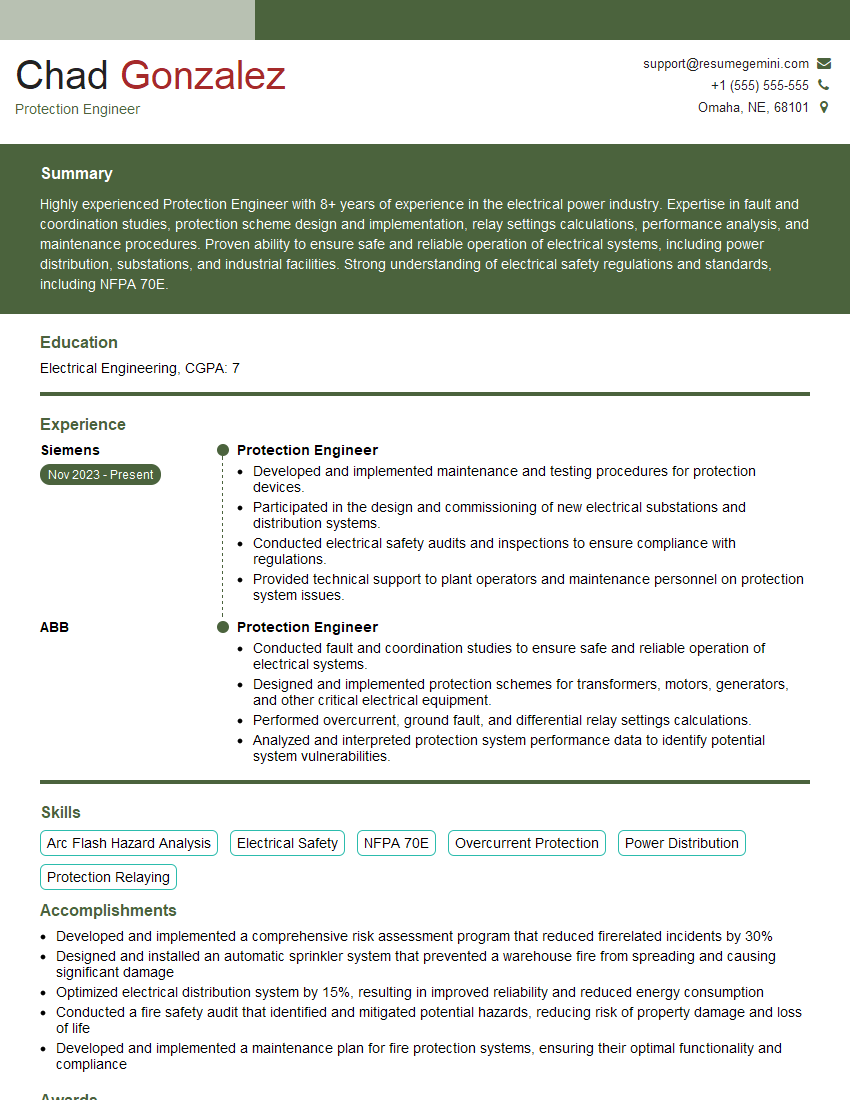Are you a seasoned Protection Engineer seeking a new career path? Discover our professionally built Protection Engineer Resume Template. This time-saving tool provides a solid foundation for your job search. Simply click “Edit Resume” to customize it with your unique experiences and achievements. Customize fonts and colors to match your personal style and increase your chances of landing your dream job. Explore more Resume Templates for additional options.

Chad Gonzalez
Protection Engineer
Summary
Highly experienced Protection Engineer with 8+ years of experience in the electrical power industry. Expertise in fault and coordination studies, protection scheme design and implementation, relay settings calculations, performance analysis, and maintenance procedures. Proven ability to ensure safe and reliable operation of electrical systems, including power distribution, substations, and industrial facilities. Strong understanding of electrical safety regulations and standards, including NFPA 70E.
Education
Electrical Engineering
October 2019
Skills
- Arc Flash Hazard Analysis
- Electrical Safety
- NFPA 70E
- Overcurrent Protection
- Power Distribution
- Protection Relaying
Work Experience
Protection Engineer
- Developed and implemented maintenance and testing procedures for protection devices.
- Participated in the design and commissioning of new electrical substations and distribution systems.
- Conducted electrical safety audits and inspections to ensure compliance with regulations.
- Provided technical support to plant operators and maintenance personnel on protection system issues.
Protection Engineer
- Conducted fault and coordination studies to ensure safe and reliable operation of electrical systems.
- Designed and implemented protection schemes for transformers, motors, generators, and other critical electrical equipment.
- Performed overcurrent, ground fault, and differential relay settings calculations.
- Analyzed and interpreted protection system performance data to identify potential system vulnerabilities.
Accomplishments
- Developed and implemented a comprehensive risk assessment program that reduced firerelated incidents by 30%
- Designed and installed an automatic sprinkler system that prevented a warehouse fire from spreading and causing significant damage
- Optimized electrical distribution system by 15%, resulting in improved reliability and reduced energy consumption
- Conducted a fire safety audit that identified and mitigated potential hazards, reducing risk of property damage and loss of life
- Developed and implemented a maintenance plan for fire protection systems, ensuring their optimal functionality and compliance
Awards
- IEEE Power & Energy Society Outstanding Engineer Award
- NFPA Fire Protection Engineering Excellence Award
- Society of Fire Protection Engineers (SFPE) Distinguished Service Award
Certificates
- Certified Protection Professional (CPP)
- Certified Fire Protection Specialist (CFPS)
- National Institute for Certification in Engineering Technologies (NICET) Level IV
- Institute of Electrical and Electronics Engineers (IEEE) Senior Member
Career Expert Tips:
- Select the ideal resume template to showcase your professional experience effectively.
- Master the art of resume writing to highlight your unique qualifications and achievements.
- Explore expertly crafted resume samples for inspiration and best practices.
- Build your best resume for free this new year with ResumeGemini. Enjoy exclusive discounts on ATS optimized resume templates.
How To Write Resume For Protection Engineer
- Highlight your expertise in fault and coordination studies, as these are critical skills for Protection Engineers.
- Quantify your accomplishments whenever possible, using specific metrics to demonstrate the impact of your work.
- Emphasize your understanding of electrical safety regulations and standards, as this is essential for ensuring the safety of electrical systems.
- Showcase your ability to work independently and as part of a team, as Protection Engineers often collaborate with other engineers and technicians.
- Consider obtaining industry certifications, such as the Certified Protection Engineer (CPE) certification from the Institute of Electrical and Electronics Engineers (IEEE), to enhance your credibility.
Essential Experience Highlights for a Strong Protection Engineer Resume
- Conduct fault and coordination studies to determine the optimal protection settings for electrical systems.
- Design and implement protection schemes for transformers, motors, generators, and other critical electrical equipment.
- Perform overcurrent, ground fault, and differential relay settings calculations to ensure proper system protection.
- Analyze and interpret protection system performance data to identify potential system vulnerabilities and recommend improvements.
- Develop and implement maintenance and testing procedures for protection devices to ensure their reliability and accuracy.
- Participate in the design and commissioning of new electrical substations and distribution systems.
- Conduct electrical safety audits and inspections to ensure compliance with regulations and industry best practices.
Frequently Asked Questions (FAQ’s) For Protection Engineer
What is the role of a Protection Engineer?
Protection Engineers are responsible for designing, implementing, and maintaining protection systems for electrical power systems. These systems protect equipment and personnel from electrical faults, such as short circuits and ground faults.
What are the key skills required for a Protection Engineer?
Key skills for Protection Engineers include fault and coordination studies, protection scheme design, relay settings calculations, performance analysis, and maintenance procedures. They also need to be familiar with electrical safety regulations and standards.
What industries employ Protection Engineers?
Protection Engineers are employed in a variety of industries, including electric utilities, manufacturing, and petrochemical. They may also work for consulting firms or engineering contractors.
What is the career outlook for Protection Engineers?
The job outlook for Protection Engineers is expected to be good in the coming years. As the demand for electricity continues to grow, so will the need for qualified professionals to design and maintain electrical protection systems.
How can I become a Protection Engineer?
To become a Protection Engineer, you typically need a bachelor’s degree in electrical engineering. You may also need to obtain industry certifications, such as the Certified Protection Engineer (CPE) certification from the IEEE.
What are the benefits of becoming a Protection Engineer?
Benefits of becoming a Protection Engineer include a competitive salary, job security, and the opportunity to work on challenging and rewarding projects.